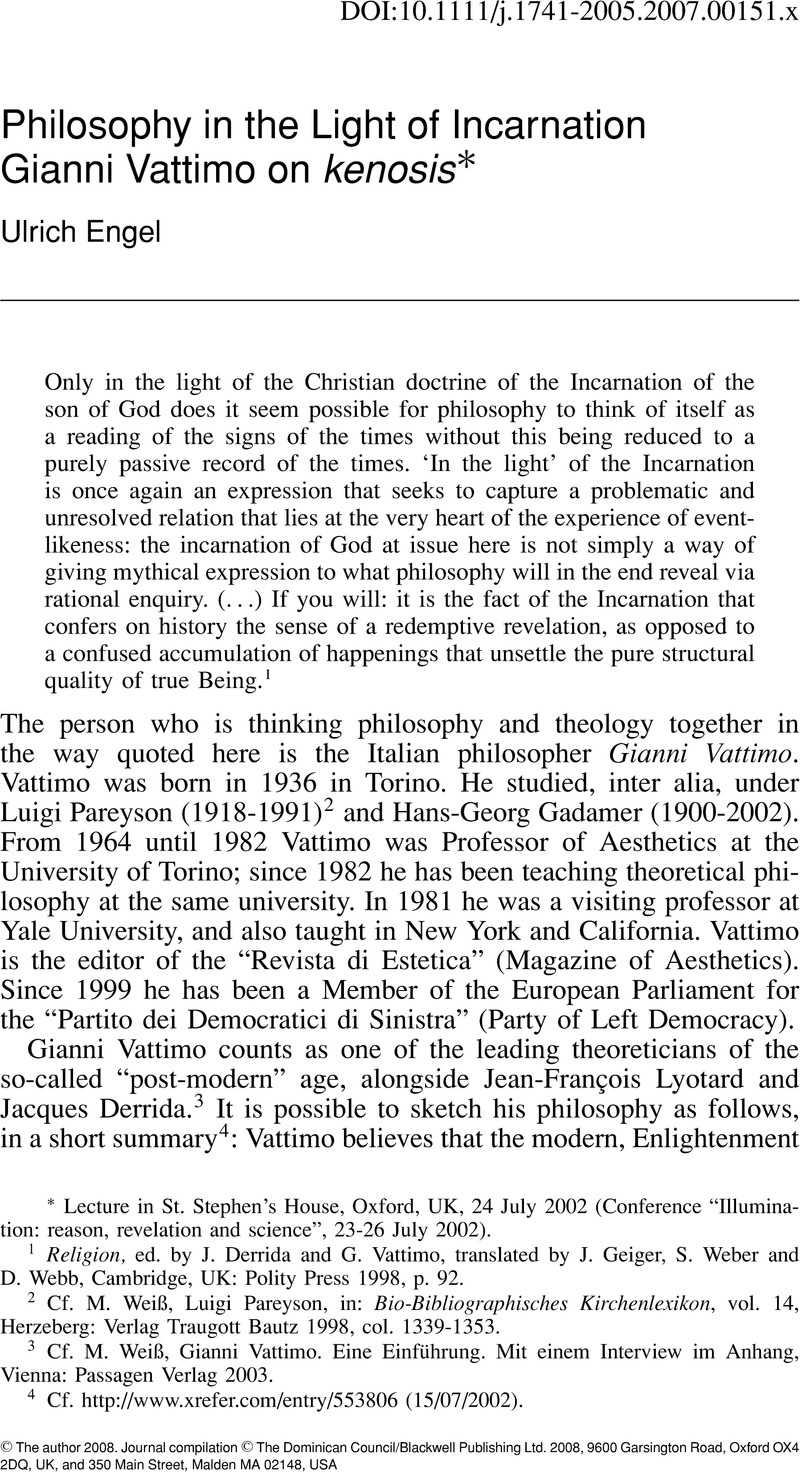Article contents
Philosophy in the Light of Incarnation Gianni Vattimo on kenosis
Published online by Cambridge University Press: 01 January 2024
Abstract

- Type
- Original Articles
- Information
- Copyright
- Copyright © The author 2008. Journal compilation © The Dominican Council/Blackwell Publishing Ltd. 2008
Footnotes
Lecture in St. Stephen's House, Oxford, UK, 24 July 2002 (Conference “Illumination: reason, revelation and science”, 23-26 July 2002).
References
1 Religion, ed. by Derrida, J. and Vattimo, G., translated by Geiger, J., Weber, S. and Webb, D., Cambridge, UK: Polity Press 1998, p. 92Google Scholar.
2 Cf. Weiß, M., Pareyson, Luigi, in: Bio-Bibliographisches Kirchenlexikon, vol. 14, Herzeberg: Verlag Traugott Bautz 1998, col. 1339-1353.Google Scholar
3 Cf. M. Weiß, Gianni Vattimo. Eine Einführung. Mit einem Interview im Anhang, Vienna: Passagen Verlag 2003.
4 Cf. http://www.xrefer.com/entry/553806 (15/07/2002).
5 G. Vattino, Credere di credere, Milano: Garzanti Editore 1996.
6 G. Vattimo, La trace de la trace, in: La religion, ed. by J. Derrida and G. Vattimo, Paris: Éditions du Seuil 1996, p. 87-104.
7 A shortened version of the lecture was recently published: G. Vattimo, Wirklichkeit, wo ist deine Wahrheit? Christentum im Zeitalter der Interpretation, in: Neue Zürcher Zeitung No. 136 (15 and 16/06/2002), p. 61 (International Edition) resp. p. 77 (Swiss Edition). The complete text is published in: G. Vattimo / R. Schröder / U. Engel, Christentum im Zeitalter der Interpretation, ed. by Th. Eggensperger (Passagen Forum), Vienna: Passagen Verlag Wien 2004, p. 17–32.
8 F. Giacobbe, Das ”schwache Denken“ Gianni Vattimos und die Wahrheitsfrage, in: Wahrheit. Recherchen zwischen Hochscholastik und Postmoderne, ed. by Th. Eggensperger and U. Engel (WSAMA.P vol. 9), Mainz: Matthias-Grünewald-Verlag 1995, p. 116-129, here 116.
9 S.Th. I 16,1c.
10 Cf. F. Nietzsche, Die fröhliche Wissenschaft, in: Kritische Studienausgabe, ed. by G. Colli / M. Montinari, vol. 3, Munich: DTV Neuausgabe 1999, p. 343-651, here 480-482.
11 M. Weiß, Die Religion der Schwäche. Gianni Vattimos Interpretation des Christentums im Kontext des Schwachen Denkens, in: Essays zu Jacques Derrida und Gianni Vattimo, ”Religion“, ed. by L. Nagl, Frankfurt/M. i.a.: Peter Lang Verlag 2001, p. 145-167, here 148.
12 Cf. F. Nietzsche, Götzen-Dämmerung, in: Kritische Studienausgabe, ibid., vol. 6, p. 55-163, here 80f.
13 M. Weiß, Die Religion der Schwäche, ibid., p. 148.
14 G. Vattimo, Jenseits der Interpretation. Die Bedeutung der Hermeneutik für die Philosophie (Edition Pandora vol. 36 / Europäische Vorlesungen vol. 8), Frankfurt/M. – New York: Campus Verlag 1997, p. 25.
15 Vgl. F. Nietzsche, Nachgelassene Fragmente 1885-1887, in: Kritische Studienausgabe, ibid., vol. 12, p. 315.
16 G. Vattimo, Wirklichkeit, wo ist deine Wahrheit?, ibid.
17 F. Giacobbe, Das ”schwache Denken“ Gianni Vattimos und die Wahrheitsfrage, ibid., p. 125 (my italics).
18 G. Vattimo, Jenseits der Interpretation, ibid., p. 25.
19 Ibid., p. 75.
20 Cf. G. Vattimo, Belief, translated by L. D'Isanto and D. Webb, Cambridge, UK: Polity Press 1999, p. 39.
21 Ibid.
22 G. Vattimo, Jenseits der Interpretation, ibid., p. 82f.
23 G. Vattimo, Belief, ibid., p. 77.
24 Cf. ibid., p. 62f. Cf. as well U. Engel, Religion and Violence. Plea for a ‘weak’ theology in tempore belli, in: New Blackfriars 82 (2001), p. 558–560.
25 G. Vattimo, Belief, ibid., p. 63.
26 Ibid., p. 64 (with reference to Augustine, In epistulam Johannis ad Parthos, X. vii. 8).
27 G. Vattimo, The Trace of the Trace, ibid., p. 80.
28 Ibid., p. 82.
29 Ibid., p. 84.
30 Ibid., p. 86.
31 Ibid.
32 Ibid.
33 M. Weiß, Die Religion der Schwäche, ibid., p. 164.
34 G. Vattimo, The Trace of the Trace, ibid., p. 88.
35 Ibid., p. 91f..
36 Cf. as well U. Engel, Philosophie (im Licht) der Inkarnation. Zu Gianni Vattimos Religionsdiskurs im Zeitalter der Interpretation, in: G. Vattimo / R. Schröder / U. Engel, Christentum im Zeitalter der Interpretation, ibid., p. 41–78, esp. 63–69. Critical of my interpretation of Vattimo: L. Oosterveen, De zwakke identiteit van het geloof. Een theologische kritik op Gianni Vattimo's interpretatie van het christendom, in: Tijdschrift voor Theologie 46 (2006), p. 333–354.
37 G. Vattimo, Belief, ibid., p. 77.
38 Cf. M. Heidegger, Nietzsches Wort „Gott ist tot“, in: Holzwege, Frankfurt/M.: Vittorio Klostermann 71994, p. 209-267, here 267. – I am indebted to M. Hofer, Jenseits von Gnosis und Nihilismus, for the reference to Heidegger. Zu Vattimos Wiederentdeckung des christlichen Gottes, in: Essays zu Jacques Derrida and Gianni Vattimo, ”Religion“, ibid., p. 169-188, here 188.
39 G. Vattimo, Belief, ibid., p. 75.
40 H. Blumenberg, Die Legitimität der Neuzeit. Erneuerte Ausgabe, Frankfurt/M.: Suhrkamp Verlag 62001, p. 12.
41 Ibid.
42 G. Vattimo, Belief, ibid., p. 21.
43 M. Weiß, Die Religion der Schwäche, ibid., p. 166. – Cf. Encyklica „Fides et ratio“ from Pope John Paul II. to the Bishops of the Catholic Church on the relationship between faith and reason, Rome 1998, No. 91.
44 Cf. M. Weiß, Die Religion der Schwäche, ibid., p. 166.
45 G. Vattimo, Belief, ibid., p. 63.
46 Ibid., p. 78.
47 Ibid.
48 Cf. Ibid., p. 64f.: “The interpretation given by Jesus Christ of Old Testament prohetics, or (better) the interpretation which he himself is, reveals its true and only meaning: God's love for his creatures. However, this ‘ultimate’ meaning precisely by virtue of its being caritas, is not really ultimate and does not possess the peremptoriness of the metaphysical principle, which cannot transcended, and before which all questioning ceases.”
49 Ibid., p. 92.
50 Cf. F. Giacobbe, Das ”schwache Denken“ Gianni Vattimos und die Wahrheitsfrage, ibid., 129.
- 1
- Cited by




